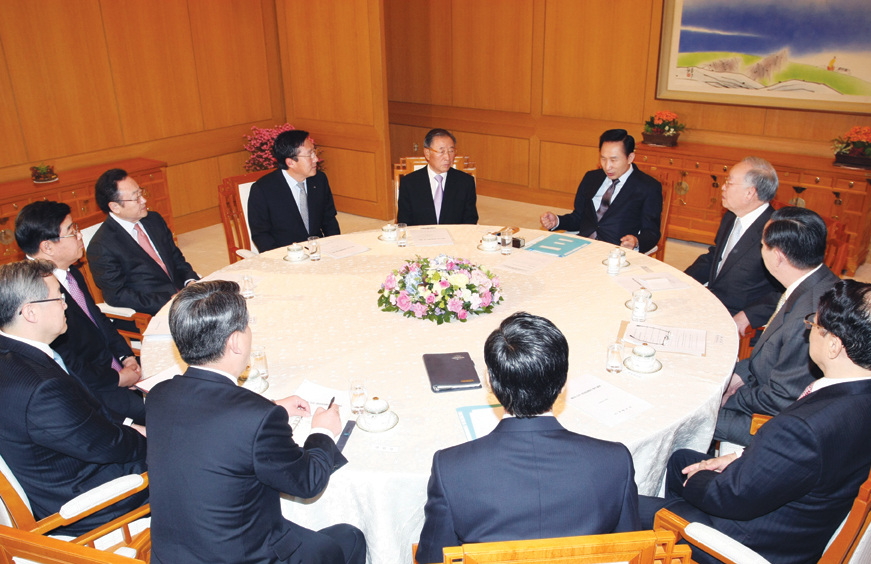Lee Upbeat About Economic Recovery
Praises G-20 Meeting for Unprecedented Agreement

President Lee Myung-bak has highly assessed the consequences of the just-ended G-20 meeting of rich and emerging nations, as the participants agreed on the need to take joint efforts to cope with the lingering global economic recession.
Lee has also been upbeat about the outlook for a possible economic recovery, citing various positive indicators.
"Fortunately, there have been positive signs from some economic indicators," he said in a speech read by his economic advisor, Sa Gong-il, during a Seoul international finance forum.
He underlined that the encouraging signs have mainly been thanks to preemptive and daring policies taken by the Korean government in coping with the economic slowdown, which will also help the world economy recover from the slump.


President Lee's statement is in line with the recent rebound in manufacturing and services industries with some institutes releasing rosy forecasts on the national economy.
Touching upon the G-20 financial summit in London, he said, "Industrial and emerging nations concurred on the need to join forces to tackle the lingering global economic crisis in an unprecedented agreement." As a matter of fact, leaders of the Group of 20 nations narrowed their differences and reached a consensus on how to tackle the unprecedented global financial and economic crisis. At the G20 summit in London Thursday, the leaders agreed on a six-point plan to restore growth, repair the financial system, strengthen financial regulations, promote global trade and reject protectionism.
They also agreed on the need to inject $1.1 trillion into the world financial system. British Prime Minister Gordon Brown said the world's 20 largest economies will spend $5 trillion in fiscal stimulus by the end of next year. U.S. President Barack Obama called the plan "unprecedented steps" to contain the global economic downturn, stimulate growth and expand loans to troubled nations.
The highlight of the summit is a compromise made by the G20 countries in an effort to iron out the many differences on how to find a solution to the worst crisis since the 1930s. It is fortunate that the leaders have avoided a potential collapse of the summit as seen in the 1933 World Economic Conference held in London amid the Great Depression. The just-ended G20 summit has drawn positive responses since it set the stage for international cooperation in fixing the turmoil.
Despite the positive side, however, critics point out that the agreement lacked concrete action plans on how to troubleshoot the ongoing disaster. They say that the leaders have only temporarily put serious discord behind them without giving much consideration to the implementation of the six-point plan. Thus, many disagreements are likely to resurface when the nations get down to business to work out follow-up steps.
Before the summit, one of the contentious points was European nations' opposition to a U.S. push for excessive fiscal stimulus. They have held America responsible for spreading its financial crisis throughout the world. And many of them have been more focused on the restoration of the shaky financial system and the consolidation of regulatory regimes. In this context, it will not be easy for the G20 nations to faithfully make good on their pledges.
Another sticking point is how to fight protectionism, which is on the rise to the detriment of free trade. The leaders agreed to reject this and promote global trade and investment to underpin prosperity. But they did not mention any plan to resume the deadlocked Doha Round of trade liberalization talks under the World Trade Organization (WTO).
It is expected that world trade will decrease by 9 percent this year from the previous year, hit hard by the global recession. In this situation, many countries tend to easily succumb to protectionism that could do more harm than good to the world economy. Especially, countries like South Korea, which are heavily dependent on exports, might be dealt a severe setback in their efforts to recover growth.
The global crisis cannot be overcome without closer cooperation between countries -- both advanced and developing nations. It is hard to find a solution at a single stroke. The world economy is expected to draw a new landscape in the crisis containment process. China has emerged as a major player at the G20 summit with its growing economic power and military clout. Pundits talk about a "G2" relationship between the U.S. and China. What's important is that economic superpowers cannot get over the crisis without the help of other countries.
Again, President Lee asserted that the recent London meeting provided the world with more hopes for economic recovery at an early date. The future global financial system will seek remarkable change, prompted by the agreement among the leaders, he added.
He also noted that world financial institutions will be required to strengthen responsibility and transparency beyond their hitherto pursuit of short-term interests only. nw
Global leaders, including Korean President Lee Myung-bak, pose for a group photo at the G-20 summit talks in London on April 2.
(clockwise) President Lee presides over his third meeting to promote trade and investments to tide over the economic crisis at Cheong Wa Dae on April 16.; President Lee talks with leaders of economic organizations on April 7 while explaining the outcome of the G-20 meeting of rich and emerging nations he attended.; and Lee and his Chinese and Japanese counterparts hold hands at their tripartite summits on the sideline of the ASEAN+3 talks in Thailand on April 11.
Photo by courtesy of the MCSTt
3Fl, 292-47, Shindang 6-dong, Chung-gu, Seoul, Korea 100-456
Tel : 82-2-2235-6114 / Fax : 82-2-2235-0799